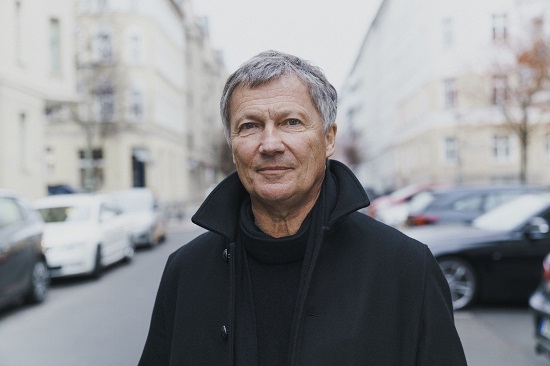Photo by Max Zerrahn
“I didn’t even have to narrow it down that much!” laughs a wry Michael Rother from the other end of a phone line. I’ve asked the German musician, responsible for works of staggering vision with Neu!, Harmonia and as a solo artist, how difficult he found it to compress all the music he’s heard in his 68 years down to just 13 LPs. “I stopped listening to music, there’s so much around all the time and I’m only in the mood from time to time. I don’t get up in the morning and switch on music, I enjoy silence!”
His Baker’s Dozen, if not curated with quite as much dedication and anxiety as many other interviewees in this feature’s rich history, makes for fascinating reading. By his own admission, and perhaps somewhat surprisingly given his own music’s focus on ambition and breadth, he’s a singles man. Almost always, when talking about an artist he’ll focus on a particular track or two, whether or not it actually featured on the album he picked – often designed as mere headings as he leads us through his life as defined by music.
His list can be divided quite cleanly into three sections, and begins with a number of the British and American rock & roll musicians that sparked his musical ambitions and led to the formation of his 60s rock group The Spirits Of Sound. Then, around about 1971, Rother’s interest in rock music simply disappeared. “I never had that much money, so I didn’t have a big record collection to begin with,” he laughs, determined not to indulge in the common ‘flash of inspiration’ narrative that has defined his entry into the revolutionary Kosmische Musik scene. “I stopped listening gradually, it was a process that went on for over a year. I became increasingly unhappy with the music Spirits Of Sound was doing, I started realising that this wasn’t something that made me happy as a thinking grown up musician.”
“It was quite easy not to listen to music, in Germany there wasn’t that much around. We had to listen to the British Forces Broadcasting Service, and there were some radio programs, but [TV show] Beat-Club was more or less the only musical event and at the time it was presenting bubblegum bands. I realised that I didn’t want to sound like anyone else, but this didn’t happen waking up one morning and thinking ‘Ok, I’ll throw this away’. It was a phase, we became unhappy and also maybe a bit confused about how and where to go to a place that was my own.
“It didn’t blow over like a cold, it was a long process, which ended in a very positive happy way when I met the Kraftwerk guys by pure chance. I just sort of stumbled into the studio and discovered that they were using using the harmonies and melodies that I could relate to, that the music was no longer based on American and British pop music structures which I wanted to leave behind. This was very fortunate really, I don’t know what would have happened to me if I’d decided not to go to that studio and instead joined my friends or had a nice evening at home. This was one of the crossroads. I took the right path, luckily.”
Then, in Rother’s Baker’s Dozen, there is a tremendous gap after the end of Harmonia in the mid-70s. “From then on it was creating my music and focussing on developing that,” Rother says. His first four solo albums, from 1977’s serene Flammende Herzen to the elegant depth of 1982’s Fernwärme have recently been reissued, something that’s been on the cards since vinyl sets for Neu! and Harmonia over the last decade.
It is not until the 2000s that Rother picks up his Baker’s Dozen, with those he befriended during a whole new wave of artists inspired by his musical vision, and by whom he remains inspired. However little he might listen to music now, he’s never lost the thrill of hearing an artist blast off in just a couple of seconds, whether Little Richard or Fuck Buttons.
Michael Rother Solo Boxset is out now on Grönland Records. He plays London’s Under The Bridge on 5 April. To begin reading his Baker’s Dozen, click the image below.


